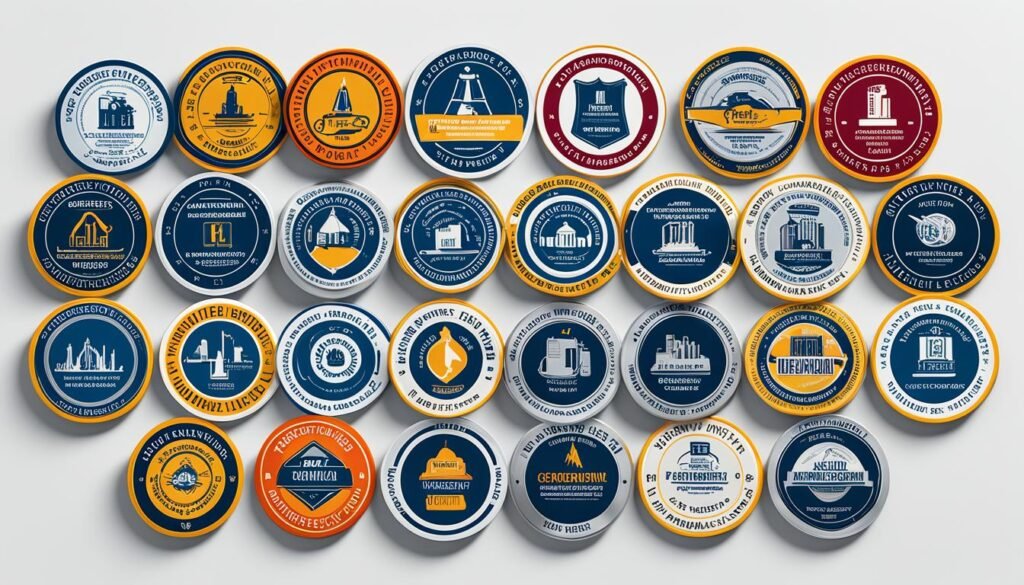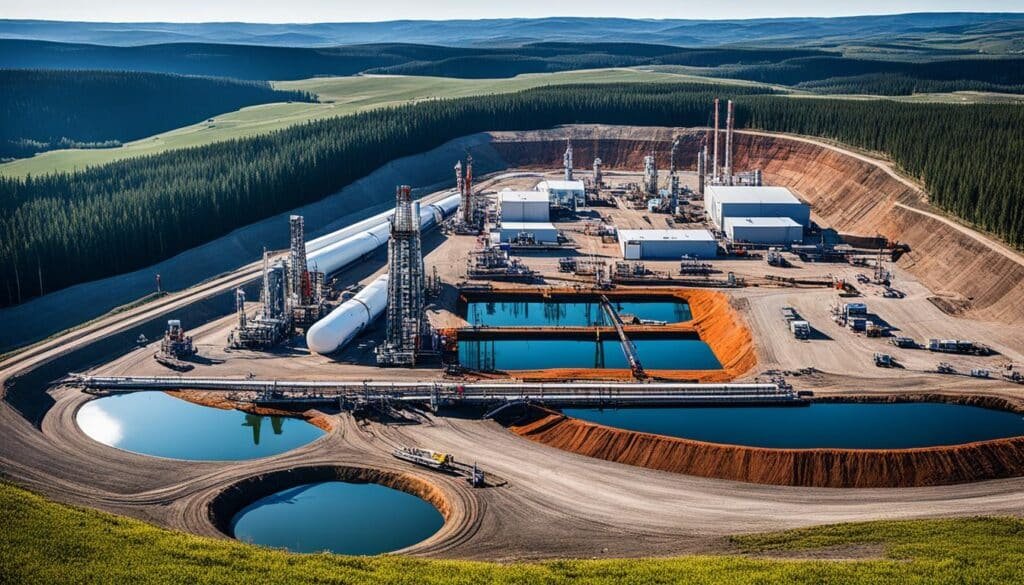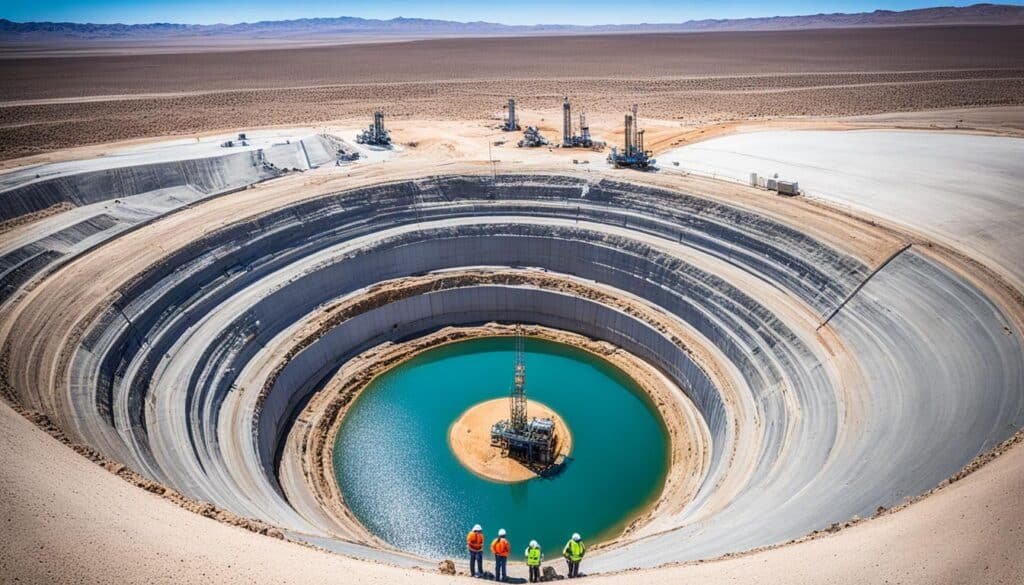Obtaining accredited petroleum engineering certifications can open doors to a wide range of opportunities in the thriving oil and gas industry. Whether you are a seasoned petroleum engineer or an aspiring professional looking to enter the field, acquiring certifications can demonstrate your expertise, boost your career prospects, and equip you with the necessary knowledge and skills to excel in this dynamic industry.
The petroleum industry offers a plethora of certificate programs and online learning platforms that cater to the diverse needs of engineers. These certifications, accredited by esteemed organizations like the Society of Petroleum Engineers (SPE) and the Department of Petroleum Engineering, can enhance your employability and showcase your commitment to professional growth.
From drilling engineers to production engineers, certifications are tailored to various specializations within petroleum engineering. By obtaining these industry-recognized credentials, you can stay updated with the latest advancements, hone your expertise, and become a sought-after professional in this fast-paced sector.
Key Takeaways:
- Petroleum engineering certifications offer numerous benefits, including enhanced career prospects and higher earning potential.
- Accredited certifications from reputable organizations like the Society of Petroleum Engineers (SPE) can unlock global job opportunities in the oil and gas industry.
- Continuous learning and staying updated with industry trends and innovations are crucial for long-term success in petroleum engineering.
- Building a strong professional network through industry conferences and online communities can lead to invaluable collaborations and career opportunities.
- Reservoir engineering certifications provide specialized knowledge and skills in analyzing reservoir behavior, reservoir simulation, and fluid flow dynamics.
Why Petroleum Engineering Certifications Matter in Today’s Job Market
In today’s highly competitive job market, petroleum engineering certifications hold immense value. The oil and gas industry highly values professionals with specialized skills and knowledge. By obtaining accredited certifications, you demonstrate your commitment to professional growth and stand out as a desirable candidate for top companies in the field. These certifications not only enhance your career prospects but also increase your earning potential significantly.
The oil and gas industry is known for its complex and challenging projects, requiring professionals with expertise in various aspects of petroleum engineering. By earning specialized certifications, such as reservoir engineering, drilling engineering, or production optimization, you showcase your ability to tackle industry-specific challenges and contribute to the success of oil and gas operations.
Having petroleum engineering certifications gives you a competitive edge in the job market, as employers often prioritize candidates with industry-recognized credentials. These certifications validate your expertise and demonstrate your dedication to continuous learning and professional development, which are highly valued traits in the ever-evolving oil and gas industry.
“Petroleum engineering certifications provide professionals with a distinct advantage in the job market, as they showcase specialized skills and knowledge that are highly sought after by employers.” – Industry Expert
Certified petroleum engineers are in high demand because they possess the specialized skills and knowledge required to navigate the intricacies of the oil and gas industry. These certifications provide you with the expertise to optimize production operations, develop sustainable practices, and reduce environmental impact, making you a valuable asset to any company in the field.
Furthermore, having petroleum engineering certifications opens up a world of career opportunities. Whether you aspire to work in exploration and production, reservoir management, drilling and completion, or any other specialized area within the industry, these certifications provide you with the necessary qualifications to excel in your chosen field.
By investing in petroleum engineering certifications, you demonstrate your commitment to professional growth and continuous learning. This dedication sets you apart from other candidates and positions you as a knowledgeable and skilled professional in the competitive job market. Employers value candidates who are willing to go the extra mile to enhance their expertise and stay updated with the latest advancements in the industry.
Ultimately, petroleum engineering certifications offer a pathway to accelerated career growth, increased earning potential, and a competitive edge in the job market. These certifications not only validate your specialized skills and knowledge but also provide you with the confidence and recognition to take on challenging roles and contribute to the success of the oil and gas industry.
Benefits of Obtaining Petroleum Engineering Certifications
Obtaining petroleum engineering certifications can have a profound impact on your career prospects, earning potential, and industry value. These certifications open up a world of enhanced career prospects, enabling you to become a desirable candidate for lucrative job opportunities in the oil and gas industry.
Career prospects: Certified petroleum engineers have a competitive edge in the job market. Employers highly value individuals with industry-recognized certifications, as they demonstrate a high level of expertise and commitment to professional growth.
Earning potential: With petroleum engineering certifications, you can expect higher earnings compared to non-certified professionals. These certifications validate your specialized skills and knowledge, making you eligible for higher-paying positions within the industry.
Challenging projects: Certified petroleum engineers often have access to more challenging projects that allow for professional growth and the application of advanced engineering techniques. This enables you to expand your skillset and take on exciting projects that push the boundaries of innovation in the field.
Global opportunities: Petroleum engineering certifications provide you with the opportunity to work on a global scale. The oil and gas industry operates worldwide, and certified professionals are sought after in various regions, offering you the chance to explore new cultures and work in diverse environments.
Networking and collaboration: Obtaining certifications in petroleum engineering allows you to join professional organizations and communities that provide valuable networking and collaboration opportunities. Interacting with industry experts and peers can lead to mentorship, partnerships, and knowledge-sharing, further enhancing your career growth.
| Benefits of Obtaining Petroleum Engineering Certifications |
|---|
| Enhanced career prospects |
| Higher earnings |
| Access to challenging projects |
| Global job opportunities |
| Networking and collaboration |
With the benefits of petroleum engineering certifications, you can accelerate your career growth, increase your earning potential, and gain recognition as a skilled professional in the oil and gas industry. Take the step to enhance your expertise and secure a successful future in this dynamic field.
Top Accredited Petroleum Engineering Certifications
Enhancing your expertise and credibility in the field of petroleum engineering is crucial for career advancement and accessing a wide range of job opportunities. Obtaining accredited petroleum engineering certifications can provide you with the necessary skills and recognition to stand out in the industry. Here are some of the top certifications offered by reputable organizations:
Society of Petroleum Engineers (SPE) Certifications:
| Certification | Description |
|---|---|
| Certified Petroleum Professional (CPP) | A certification that validates your expertise in various aspects of petroleum engineering, including drilling, reservoir management, and production optimization. |
| Certified Drilling Engineer (CDE) | A certification that focuses on the specialized knowledge and skills required for efficient and safe drilling operations. |
| Certified Reservoir Engineer (CRE) | A certification that demonstrates your proficiency in evaluating and managing reservoirs, including reservoir simulation and enhanced oil recovery techniques. |
American Association of Petroleum Geologists (AAPG) Certification:
| Certification | Description |
|---|---|
| Certified Petroleum Geologist (CPG) | A certification that focuses on the geology and exploration aspects of the petroleum industry, providing expertise in evaluating hydrocarbon resources and reservoir behavior. |
Project Management Professional (PMP) Certification:
In addition to the specialized petroleum engineering certifications, obtaining a Project Management Professional (PMP) certification can greatly enhance your credentials as a petroleum engineer. This certification validates your proficiency in project management principles and practices, allowing you to effectively lead complex engineering projects in the oil and gas industry.
By obtaining these accredited certifications, you can showcase your expertise and dedication, gaining a competitive edge in the job market and opening doors to lucrative career opportunities. Additionally, these certifications offer networking opportunities and professional development resources, keeping you up-to-date with the latest industry advancements.

Continue reading to discover the significance of reservoir engineering certifications and how they can enhance your technical expertise in the field.
The Role of Reservoir Engineering Certifications
Reservoir engineering certifications play a vital role in the oil and gas industry, equipping professionals with the necessary expertise to analyze subsurface reservoirs and make informed decisions regarding the exploration and extraction of hydrocarbon resources. Reservoir engineers are responsible for understanding and managing underground reservoirs, gathering data, analyzing reservoir properties, and designing strategies to optimize the recovery of oil and gas.
Through reservoir engineering certifications, professionals gain specialized knowledge that enhances their employability and provides industry recognition. These certifications also facilitate valuable networking opportunities, allowing reservoir engineers to connect with peers, experts, and potential employers in the field.
One of the key aspects of reservoir engineering is reservoir behavior analysis, which involves studying the dynamic characteristics of subsurface reservoirs, such as fluid flow, pressure changes, and reservoir performance over time. Reservoir engineers employ advanced techniques and tools, including reservoir simulation, to model and predict reservoir behavior, enabling them to devise effective reservoir management strategies.

The Benefits of Reservoir Engineering Certifications:
- Enhanced employability: Reservoir engineering certifications make professionals stand out in the competitive job market, increasing their chances of securing lucrative positions in the oil and gas industry.
- Specialized knowledge: Certifications provide in-depth knowledge of reservoir engineering principles, techniques, and best practices, enabling professionals to excel in their field.
- Industry recognition: Reservoir engineering certifications are highly regarded in the industry, earning professionals the respect and credibility of their peers and employers.
- Networking opportunities: By obtaining certifications, reservoir engineers gain access to networking events, conferences, and communities where they can connect and collaborate with industry experts.
Reservoir Engineering Certifications Table:
| Certification | Offering Organization | Description |
|---|---|---|
| Certified Reservoir Engineer (CRE) | Society of Petroleum Engineers (SPE) | This certification focuses on advanced reservoir engineering concepts, practices, and project management skills. |
| Certified Reservoir Management Specialist (CRMS) | American Association of Petroleum Geologists (AAPG) | A certification that emphasizes reservoir management techniques, including reservoir surveillance, production optimization, and field development planning. |
| Reservoir Simulation Engineer (RSE) | Society of Petroleum Engineers (SPE) | This certification focuses on reservoir simulation techniques, software tools, and data analysis for reservoir performance optimization. |
Popular Reservoir Engineering Certifications
Reservoir engineering certifications are highly sought-after credentials for professionals in the petroleum industry. These certifications validate the expertise and knowledge of reservoir engineers, enabling them to excel in their careers. Here are some popular reservoir engineering certifications:
Certified Petroleum Engineer (CPE)
The Certified Petroleum Engineer (CPE) certification is offered by the Society of Petroleum Engineers (SPE). It is designed for engineers who specialize in reservoir engineering and involves a rigorous examination process to evaluate their proficiency in areas such as reservoir analysis, simulation, and management. Achieving the CPE certification demonstrates a high level of competence and commitment to excellence in reservoir engineering.
Reservoir Evaluation and Management (REM) Certification
The Reservoir Evaluation and Management (REM) Certification is offered by the American Association of Petroleum Geologists (AAPG). This certification focuses on the evaluation and management of reservoirs, including the assessment of reserves, production forecasting, and reservoir characterization. It is a prestigious credential that signifies expertise in reservoir evaluation and management.
Reservoir Engineer Certification (REC)
The Reservoir Engineer Certification (REC) is offered by the Society of Petroleum Evaluation Engineers (SPEE). This certification recognizes professionals who demonstrate advanced knowledge and skills in reservoir engineering. The rigorous requirements for REC certification ensure that individuals possess the necessary expertise in reservoir simulation, fluid flow analysis, and reservoir performance evaluation.

| Certification | Offered by | Focus |
|---|---|---|
| Certified Petroleum Engineer (CPE) | Society of Petroleum Engineers (SPE) | Reservoir engineering |
| Reservoir Evaluation and Management (REM) Certification | American Association of Petroleum Geologists (AAPG) | Reservoir evaluation and management |
| Reservoir Engineer Certification (REC) | Society of Petroleum Evaluation Engineers (SPEE) | Reservoir engineering |
How Reservoir Engineering Certifications Enhance Technical Expertise in the Field
Reservoir engineering certifications provide professionals with the specialized knowledge and technical expertise required to excel in the field. These certifications focus on key areas such as reservoir characterization, fluid flow dynamics, reservoir simulation, and enhanced oil recovery techniques. By obtaining these certifications, reservoir engineers gain the skills necessary to analyze complex reservoir challenges and develop effective solutions.
Reservoir characterization is a fundamental aspect of reservoir engineering. It involves analyzing various data sources, including geological and geophysical data, to understand the physical properties and behavior of the reservoir. Through reservoir engineering certifications, professionals learn how to interpret and utilize this data effectively, allowing them to make informed decisions about reservoir management and optimization.
Fluid flow dynamics is another critical area covered in reservoir engineering certifications. Professionals gain a deep understanding of fluid behavior within the reservoir, including factors such as pressure distribution, flow rates, and fluid properties. This knowledge is vital for designing efficient production and injection strategies to maximize hydrocarbon recovery.
Reservoir simulation is a powerful tool used by reservoir engineers to model and predict reservoir behavior under various operating conditions. Reservoir engineering certifications equip professionals with the skills to develop accurate reservoir simulation models, perform sensitivity analysis, and make reliable forecasts of production performance. These simulations help optimize production strategies, reduce uncertainty, and improve reservoir management decisions.
Enhanced oil recovery techniques are a valuable component of reservoir engineering certifications. These techniques aim to increase oil recovery beyond what is possible through primary production methods. Professionals learn about various enhanced oil recovery methods like water flooding, gas injection, chemical flooding, and thermal methods. By understanding these techniques, reservoir engineers can design and implement strategies to unlock additional hydrocarbon reserves and optimize reservoir performance.
Reservoir engineering certifications provide professionals with the technical expertise necessary for analyzing reservoir challenges, optimizing production, and maximizing hydrocarbon recovery. These certifications ensure that reservoir engineers are well-equipped to make informed decisions that have a significant impact on reservoir performance and the overall success of oil and gas projects.

| Key Areas of Reservoir Engineering Certifications | Benefits |
|---|---|
| Reservoir Characterization | Improved understanding of reservoir behavior and optimization of management strategies. |
| Fluid Flow Dynamics | Enhanced ability to design efficient production and injection strategies for maximum recovery. |
| Reservoir Simulation | Accurate modeling and forecasting of reservoir behavior, leading to optimized production decisions. |
| Enhanced Oil Recovery Techniques | Knowledge of advanced methods to unlock additional hydrocarbon reserves and improve recovery. |
The Significance of Reservoir Engineering Certifications in Career Growth
Obtaining reservoir engineering certifications can have a significant positive impact on career growth. These certifications not only enhance your technical expertise but also open doors to higher earning potential, career advancement, and global job opportunities.
Reservoir engineers play a crucial role in the oil and gas industry, with responsibilities ranging from analyzing reservoir behavior to designing strategies for optimizing oil and gas recovery. By obtaining reservoir engineering certifications, you demonstrate your commitment to professional development and showcase your expertise in this specialized field.
Certified reservoir engineers have access to a wide range of career opportunities, both domestically and internationally. With the ever-increasing demand for sustainable practices in the industry, certified professionals can contribute positively by developing and implementing environmentally responsible solutions.
Moreover, these certifications can significantly impact your earning potential. As a certified reservoir engineer, you possess the skills and knowledge needed to tackle complex engineering challenges, making you a valuable asset to organizations. This increased value often translates into higher salaries and better compensation packages.
Furthermore, reservoir engineering certifications can pave the way for career advancement. By showcasing your expertise through accredited certifications, you become a competitive candidate for leadership roles and higher positions within the industry. These certifications provide a strong foundation for continued growth and professional success.
Ultimately, reservoir engineering certifications not only benefit your individual career growth but also contribute to the overall sustainability and positive impact of the oil and gas industry. By staying updated with the latest industry standards and practices, certified professionals play a key role in driving innovation and implementing sustainable solutions.
Investing in reservoir engineering certifications is a strategic move that can propel your career forward while making a meaningful difference in the industry. Whether you are aiming for higher earning potential, career advancement, or global opportunities, reservoir engineering certifications are a valuable asset that can shape your professional journey.

Continuous Learning and Skill Development in the Oil and Gas Industry
In the fast-paced and ever-changing oil and gas industry, continuous learning and skill development are essential for professionals to stay ahead of the curve and thrive in their careers. By embracing industry-specific training programs, attending conferences, utilizing online learning platforms, and staying informed about market trends and innovations, individuals can enhance their expertise and position themselves as industry leaders.
Industry-specific training programs provide professionals with valuable insights, practical knowledge, and specialized skills that are directly applicable to their roles in the oil and gas sector. These programs cover a range of topics such as drilling techniques, reservoir management, production optimization, and environmental sustainability. By actively participating in these programs, individuals broaden their understanding of industry best practices and gain a competitive edge.
“Continuous learning is not only a personal endeavor. It is a crucial factor in driving innovation, efficiency, and advancement in the oil and gas industry. By investing in skill development, professionals can contribute to the overall growth and transformation of the industry.”
Conferences offer an excellent platform for professionals to network with industry experts, exchange ideas, and stay updated on the latest advancements and trends. These events often feature keynote speakers, panel discussions, and technical sessions that provide valuable insights and foster collaboration. Attending conferences allows individuals to expand their professional network, gain new perspectives, and explore potential career opportunities.
Online learning platforms have revolutionized the way professionals engage in continuous education. These platforms provide convenient access to a vast array of courses, webinars, and resources that can be tailored to meet individual learning needs. From technical courses on reservoir engineering to leadership and project management courses, online learning platforms offer flexibility and convenience, enabling professionals to upskill and acquire new knowledge at their own pace.
To stay informed about market trends and innovations, professionals must actively engage in staying up-to-date with industry news, research papers, and publications. Subscribing to industry publications, joining professional associations, and participating in online forums are effective ways to stay abreast of the latest developments. By remaining informed, professionals can anticipate industry shifts, identify emerging opportunities, and adapt their skills and strategies.
Continuous learning and skill development are not only essential for personal growth but also for the success and sustainability of the oil and gas industry. With the complex challenges and rapid advancements in technology, professionals must proactively invest in their professional development to stay competitive and make valuable contributions to the industry’s progress and evolution.
Building a Strong Professional Network in the Oil and Gas Industry
Building a strong professional network is crucial for career growth in the oil and gas industry. Connecting with industry experts, peers, and potential employers through various networking opportunities can provide valuable insights, collaborations, and career opportunities. Here are some effective ways to build your professional network:
1. Industry Conferences
Attending industry conferences and events is an excellent way to meet professionals from diverse backgrounds within the oil and gas industry. These gatherings provide a platform to exchange ideas, learn about the latest industry trends, and establish meaningful connections. Take advantage of networking sessions and engage in conversations to expand your network.
2. Online Communities
Joining online communities and forums specific to the oil and gas industry can broaden your network significantly. Platforms like Reddit, Quora, and specialized online communities allow you to connect with professionals worldwide, exchange knowledge, and collaborate on industry-related projects. Active participation in these communities can help you establish yourself as a knowledgeable and valuable resource.
3. LinkedIn Groups
Utilize LinkedIn groups dedicated to the oil and gas industry to connect with professionals, share insights, and join relevant discussions. Actively engage in conversations, contribute valuable content, and make meaningful connections with industry leaders and potential employers. LinkedIn is a powerful tool for networking and staying updated with the latest industry news and opportunities.
Remember, building a strong professional network is not just about connecting with others—it’s about meaningful interactions, mutual support, and establishing long-lasting relationships. Take the initiative to reach out, attend industry events, and actively participate in online communities to expand your network and unlock new opportunities in the oil and gas industry.
Image: Building a strong professional network in the oil and gas industry.
Also Read:- Mastering The Basics Of Construction Engineering – A Guide
Conclusion
In conclusion, petroleum engineering certifications are essential for professionals looking to excel in the oil and gas industry. These accredited certifications open doors to exciting career opportunities, allowing individuals to showcase their expertise and stand out in a competitive job market. By obtaining these certifications, professionals can enhance their skills, increase their earning potential, and gain access to global job opportunities.
Continuous learning is crucial in this ever-evolving industry. Professionals must stay updated with market trends, emerging technologies, and industry practices to remain competitive. Additionally, embracing digital transformation is vital for long-term success. The oil and gas industry is undergoing significant changes, and professionals need to adapt to new technologies, such as data analytics and automation, to stay ahead.
To thrive in the oil and gas industry, professionals must commit to continuous learning and embrace digital transformation. By obtaining petroleum engineering certifications, individuals can unlock a wealth of career opportunities and demonstrate their commitment to growth and excellence. With a combination of specialized skills, continuous learning, and a willingness to adapt, professionals can succeed in this dynamic industry.
FAQs
What are petroleum engineering certifications?
Petroleum engineering certifications are credentials that demonstrate expertise in specific areas of petroleum engineering, such as drilling, reservoir engineering, and production optimization.
Why do petroleum engineering certifications matter in today’s job market?
Petroleum engineering certifications matter in today’s job market because they enhance career prospects, increase earning potential, and showcase specialized skills that are highly valued in the oil and gas industry.
What are the benefits of obtaining petroleum engineering certifications?
Obtaining petroleum engineering certifications enhances career prospects, leads to higher earnings, provides access to challenging projects and global opportunities, and fosters networking and collaboration with industry professionals.
What are some top accredited petroleum engineering certifications?
Some top accredited petroleum engineering certifications include Certified Petroleum Professional (CPP), Certified Drilling Engineer (CDE), Certified Reservoir Engineer (CRE), Certified Petroleum Geologist (CPG), and Project Management Professional (PMP).
What is the role of reservoir engineering certifications?
Reservoir engineering certifications equip professionals with the expertise to analyze subsurface reservoirs, gather data, analyze reservoir properties, and design strategies for optimizing the recovery of oil and gas resources.
What are some popular reservoir engineering certifications?
Popular reservoir engineering certifications include Certified Petroleum Engineer (CPE), Reservoir Evaluation and Management (REM) Certification, and Reservoir Engineer Certification (REC).
How do reservoir engineering certifications enhance technical expertise in the field?
Reservoir engineering certifications provide specialized knowledge in reservoir characterization, fluid flow dynamics, reservoir simulation, and enhanced oil recovery techniques, enabling professionals to analyze complex reservoir challenges and develop effective solutions.
What is the significance of reservoir engineering certifications in career growth?
Reservoir engineering certifications can lead to higher earning potential, career advancement opportunities, global job prospects, and the ability to contribute to sustainability in the industry by minimizing environmental impact.
How can professionals continuously learn and develop skills in the oil and gas industry?
Professionals can engage in industry-specific training programs, attend conferences, participate in online learning platforms, and stay informed about market trends and innovations to continuously learn and develop skills in the oil and gas industry.
How can professionals build a strong professional network in the oil and gas industry?
Professionals can build a strong professional network in the oil and gas industry by attending industry conferences, engaging in online communities, and joining LinkedIn groups to connect with industry experts, peers, and potential employers.
What is the conclusion about petroleum engineering certifications?
Petroleum engineering certifications are valuable credentials that unlock career opportunities in the oil and gas industry, facilitate continuous learning, and position professionals for success in a dynamic industry undergoing digital transformation.
Source Links
- https://jpt.spe.org/twa/transferable-skills-petroleum-engineering-and-geoscience-skills-are-shaping-the-low-emission-energy-transition
- https://utilitiesone.com/certifications-for-petroleum-engineering-professionals
- https://utilitiesone.com/the-role-of-reservoir-engineering-certifications

